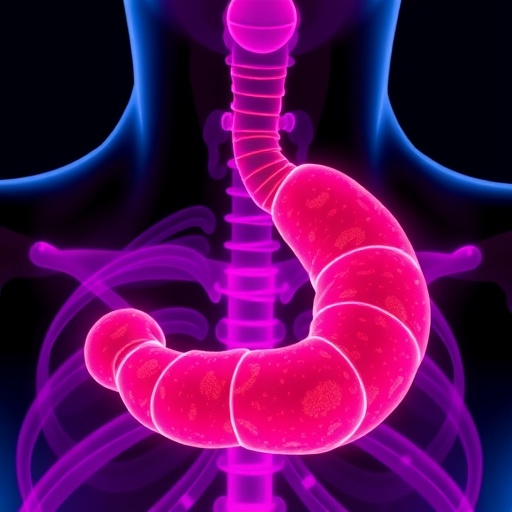In a groundbreaking study published in the Journal of Cancer Research and Clinical Oncology, researchers have delved into the efficacies of neoadjuvant immunochemotherapy specifically tailored for patients suffering from locally advanced esophageal squamous cell carcinoma (ESCC). This retrospective analysis offers invaluable insights into patient outcomes, particularly focusing on a rigorous two-year survival assessment. As global cancer rates continue to rise, novel therapeutic approaches like this are crucial for medical professionals striving to enhance survival rates and improve treatment modalities.
Esophageal squamous cell carcinoma, a disease marked by poor prognosis and high mortality rates, poses significant treatment challenges. Traditionally, the approach towards managing advanced ESCC has involved chemotherapy and radiation; however, these methodologies often fall short in achieving lasting remissions. The addition of immunotherapy represents a paradigm shift that could potentially enhance patient responses by utilizing the body’s immune system to combat cancer cells more effectively.
In the conducted study, the researchers reviewed a cohort of patients who were treated with neoadjuvant immunochemotherapy prior to undergoing surgical intervention. This approach enabled a comprehensive evaluation of treatment impacts before the patients received definitive surgical therapy. The authors emphasized the necessity of rigorously assessing these treatments, particularly since the window between diagnosis and surgery often complicates standardized care pathways.
One of the salient features of this study is its focus on survival analysis over a two-year period, providing a robust framework for understanding the longer-term impacts of the neoadjuvant treatment approach. Researchers documented significant data on survival rates, showing a marked improvement among patients who received the innovative treatment compared to those subjected solely to traditional chemoradiotherapy. This outcome reflects a potential shift in clinical practice patterns, where integrating immunotherapy could become a new standard in treating aggressive forms of ESCC.
Moreover, the research meticulously outlined the specific immunotherapeutic agents employed in the study, detailing their mechanisms of action and how they synergize with chemotherapy. For instance, the combination of immune checkpoint inhibitors alongside conventional chemotherapeutic agents creates a dual action plan: one that diminishes tumor size and simultaneously promotes an immune-mediated attack against residual cancer cells. This synergy not only maximizes the efficacy of chemotherapy but enhances overall patient resilience against cancer recurrence.
The study’s authors also took a moment to discuss the potential implications for personalized medicine. With ongoing advancements in genomic profiling, there’s an opportunity to tailor immunotherapy protocols to individual patient tumor profiles. This could further enhance efficacy and minimize adverse effects, making the treatments more patient-friendly and accessible. Such individualized approaches could revolutionize how oncologists manage esophageal cancers, transforming treatment landscapes and prioritizing patient-centric care.
Furthermore, one of the essential aspects of neoadjuvant immunochemotherapy is the monitoring and management of immune-related adverse events. Although these interventions present considerable benefits, they are not devoid of risks. Highlighting the necessity for close monitoring, the researchers provided a framework for managing these side effects so that treatment pathways could remain safe and effective. Ensuring that all patient experiences are documented meticulously is paramount to refining treatment protocols in the future.
Critically, the study also emphasized the importance of the multidisciplinary team approach in managing complicated cancer cases like ESCC. Surgeons, medical oncologists, radiation oncologists, pathologists, and nursing staff must work collaboratively to develop treatment plans tailored to the unique needs of each patient. Collaborative efforts lead to increased treatment adherence, improved overall patient satisfaction, and ultimately better health outcomes, underlining the necessity of teamwork in modern oncology practices.
In terms of societal impact, the dissemination of successful treatment strategies for ESCC, particularly advanced cases, has the potential to significantly alleviate the burden of this disease. As the world grapples with the peaks of cancer incidence, identifying and validating effective therapeutic approaches may lead to comprehensive public health initiatives and resource allocation policies that ensure patients receive timely and appropriate care.
Lastly, this study serves as a call-to-action for further research in the domain of immunotherapy, particularly within the realm of thoracic oncology. While the results are promising, they also open the door to various inquiries: What are the optimal combinations of immunotherapies and chemotherapeutics? How do genomics dictate responses to these innovative treatments? Could further advancements in technology pave the way for enhanced monitoring of treatment efficacy and patient outcomes? These questions illuminate the exciting possibilities that lie ahead for researchers and practitioners committed to advancing cancer care.
In conclusion, the findings from Li et al. pave the way for an evolution in the management of locally advanced esophageal squamous cell carcinoma. By leveraging neoadjuvant immunochemotherapy, there is hope for significant improvements in patient outcomes and survival rates. As research continues to unfold, the oncological community remains focused on refining these strategies for patients battling one of the most challenging cancers of modern times.
Subject of Research: Neoadjuvant immunochemotherapy in locally advanced esophageal squamous cell carcinoma
Article Title: Neoadjuvant immunochemotherapy in locally advanced esophageal squamous cell carcinoma: a retrospective study with 2-year survival analysis
Article References:
Li, CR., Chen, YZ., Li, B. et al. Neoadjuvant immunochemotherapy in locally advanced esophageal squamous cell carcinoma: a retrospective study with 2-year survival analysis.
J Cancer Res Clin Oncol 151, 217 (2025). https://doi.org/10.1007/s00432-025-06263-1
Image Credits: AI Generated
DOI: 10.1007/s00432-025-06263-1
Keywords: esophageal squamous cell carcinoma, neoadjuvant immunochemotherapy, survival analysis, cancer treatment, personalized medicine, immune checkpoint inhibitors.




